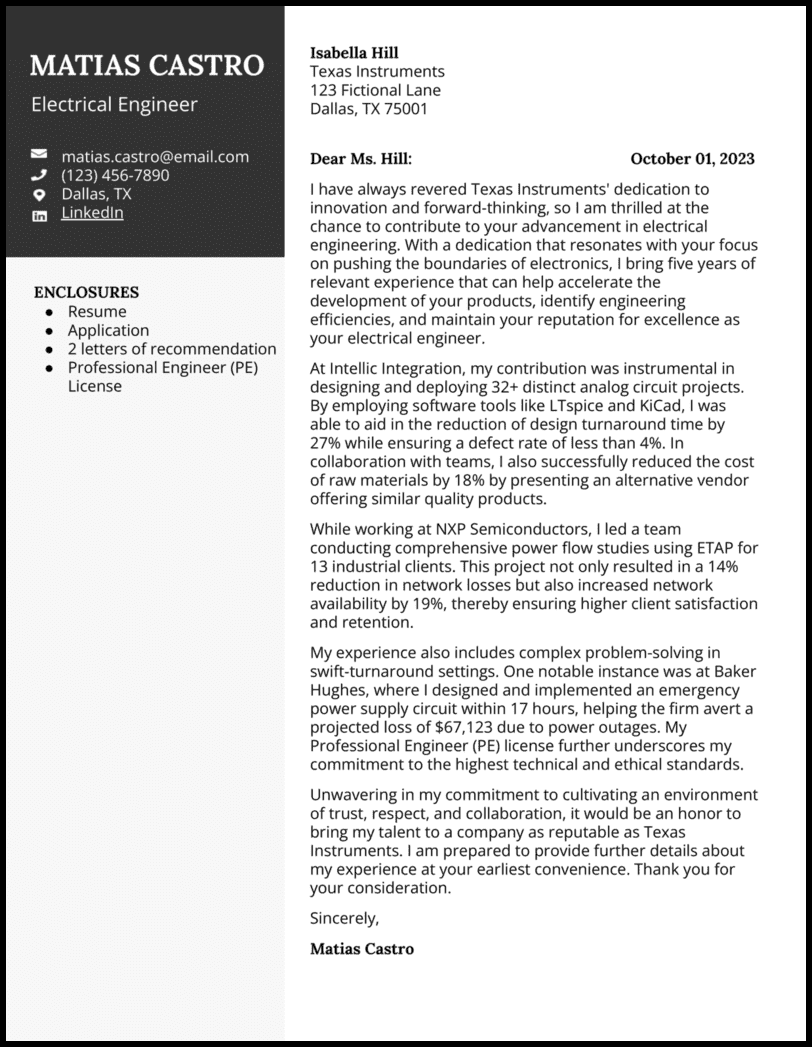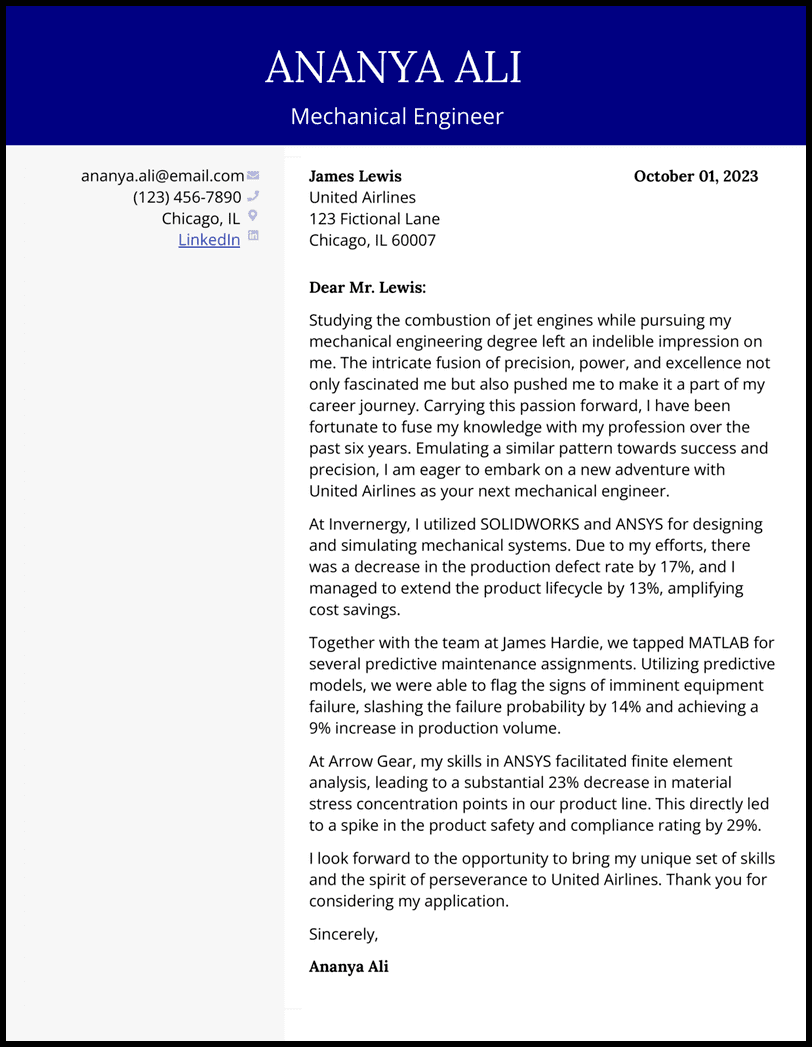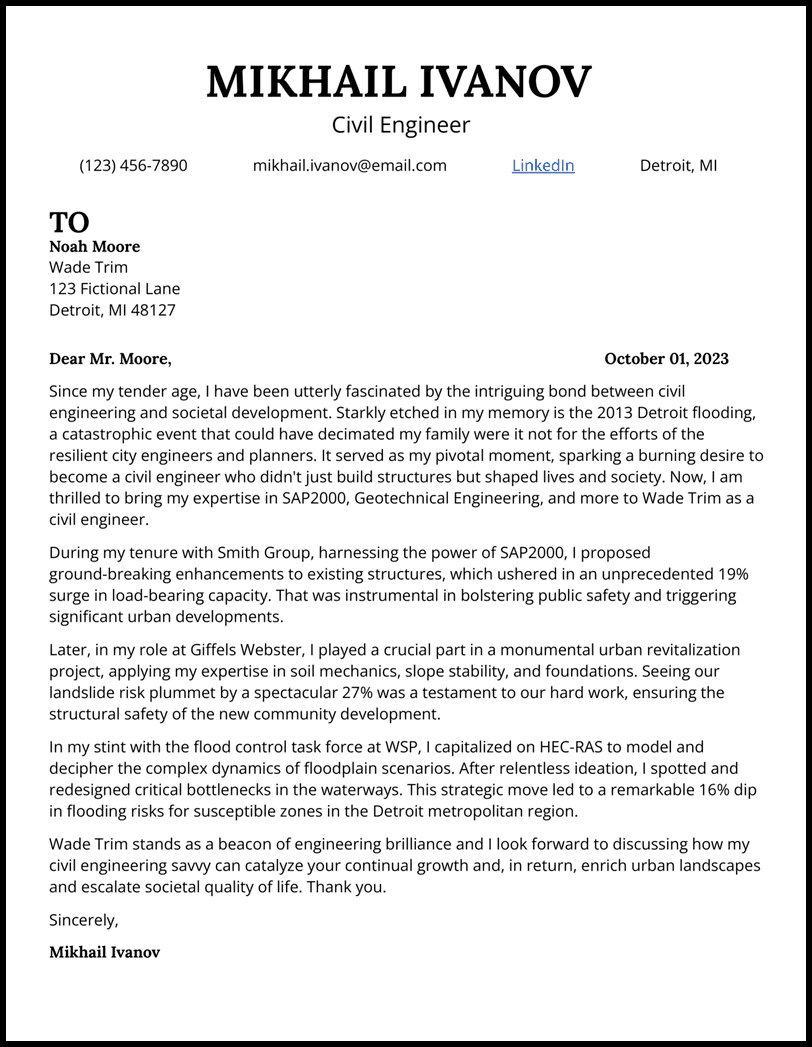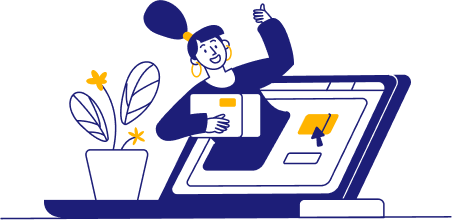






As an engineer, your role significantly shapes the world around us. You’re the problem solver, the innovator, and the driving force behind complex projects. Your skills are diverse and impactful, from designing sustainable infrastructure to optimizing machinery and electrical systems.
But when it comes to writing a cover letter to complement your engineering resume, it’s a different ball game, and it can definitely feel a bit daunting. We understand that articulating your engineering prowess on paper can be a challenge.
That’s why we’re here to guide you through the process. Just follow our engineer cover letter examples and tips to simplify this unique writing task and fast forward to landing your dream job in engineering.
Copy this text for your engineering cover letter!
123 Fictional Avenue
Dallas, TX 75001
(123) 456-7890
October 01, 20XX
Isabella Hill
Texas Instruments
123 Fictional Lane
Dallas, TX 75001
Dear Ms. Hill:
I have always revered Texas Instruments’ dedication to innovation and forward-thinking, so I am thrilled at the chance to contribute to your advancement in electrical engineering. With a dedication that resonates with your focus on pushing the boundaries of electronics, I bring five years of relevant experience that can help accelerate the development of your products, identify engineering efficiencies, and maintain your reputation for excellence as your electrical engineer.
At Intellic Integration, my contribution was instrumental in designing and deploying 32+ distinct analog circuit projects. By employing software tools like LTspice and KiCad, I was able to aid in the reduction of design turnaround time by 27% while ensuring a defect rate of less than 4%. In collaboration with teams, I also successfully reduced the cost of raw materials by 18% by presenting an alternative vendor offering similar quality products.
While working at NXP Semiconductors, I led a team conducting comprehensive power flow studies using ETAP for 13 industrial clients. This project not only resulted in a 14% reduction in network losses but also increased network availability by 19%, thereby ensuring higher client satisfaction and retention.
My experience also includes complex problem-solving in swift turnaround settings. One notable instance was at Baker Hughes, where I designed and implemented an emergency power supply circuit within 17 hours, helping the firm avert a projected loss of $67,123 due to power outages. My Professional Engineer (PE) license further underscores my commitment to the highest technical and ethical standards.
Unwavering in my commitment to cultivating an environment of trust, respect, and collaboration, it would be an honor to bring my talent to a company as reputable as Texas Instruments. I am prepared to provide further details about my experience at your earliest convenience. Thank you for your consideration.
Sincerely,
Matias Castro
Enclosures:
Resume
Application
2 letters of recommendation
Professional Engineer (PE) License
Why this cover letter works
- This role demands electrical engineering proficiencies like production processes, software (cue KiCad and ETAP), programming, and familiarity with relevant tech (Think circuits). Articulate applications of such relevant skills and quantified impacts you fostered.
- Also, see how Matias enthusiastically kicks off this engineering cover letter. In addition, one or two soft skills should suffice (cue communication skills, project management, and problem-solving).
Level up your
cover letter game
Relax! We’ll do the heavy lifting to write your cover letter in seconds.
Copy this text for your entry-level engineering cover letter!
123 Fictional Avenue
Charlotte, NC 28202
(123) 456-7890
October 20, 2026
Mia Thomas
AECOM
123 Fictional Lane
Charlotte, NC 28202
Dear Ms. Thomas:
The wonder of our planet has always captivated me, a fascination that grew into a passion for technology and, eventually, a commitment to fostering a sustainable future. This passion steered me toward obtaining my civil engineering degree. With a robust skill set in software development, keen leadership in Scrum methodologies, and a collaborative spirit, I’m thrilled at the prospect of addressing the complexities involved in devising sustainable and groundbreaking engineering solutions at AECOM.
I actively contributed to the Urban Infrastructure Optimization project at Capstone Civil Group, proposing design modifications that cut construction costs by 9% and improved accuracy. My experience extends to using engineering software like AutoCAD and ArcGIS, which is directly relevant to the fieldwork and site inspection tasks described in your job posting. Additionally, my volunteer work assessing coastal resilience involved using ArcGIS for structural integrity analysis, showcasing my capability in handling complex data and field evaluations.
An internship at Wildlands Engineering enriched me with valuable experience in water resources engineering. Here, I assisted senior engineers in developing floodplain mapping models and improving flood risk assessments for over 16 properties. This experience reinforced my passion for sustainable infrastructure and gave me valuable skills to apply at AECOM.
My role as a gas attendant at QuickTrip allowed me to refine my efficiency and safety management skills. By analyzing traffic patterns and leading safety initiatives, I reduced wait times by 12% and decreased workplace accidents to just three incidents over eight months. These experiences underline my ability to support project managers effectively and contribute to your high-functioning team.
AECOM’s dedication to sustainable and transformative projects resonates with my career goals and personal values. I’m excited about applying my skills in a dynamic environment and contributing to your impactful initiatives. Thank you for considering my application; discussing how my background aligns with this civil engineering assistant role would be highly welcomed.
Sincerely,
Noah Garcia
Enclosures:
Resume
Transcript
2 letters of recommendation
Why this cover letter works
- You’ve witnessed storytelling work its magic in marketing. Surprisingly, the same can be said of job applications; you’re essentially pitching yourself, after all. How about briefly touching on your inspiration for engineering right at the beginning of your entry level engineering cover letter?
- Take Noah, for example. He connects the dots between his fascination for Planet Earth, commitment to a sustainable future, and drive to study civil engineering. Doesn’t that paint a picture of a passionate candidate, possibly with much potential waiting to be unleashed? But more than that, it’s a great strategy for building rapport with the recruiter reading your piece and setting your candidacy up for success.
Copy this text for your computer engineering cover letter!
123 Fictional Avenue
Philadelphia, PA 19102
(123) 456-7890
February 24, 20XX
Daniel Thompson
Comcast
123 Fictional Lane
Philadelphia, PA 19102
Dear Mr. Thompson:
At Comcast, a scalable solution to a company at the forefront of shaping the future of technology and connectivity, I want to combine my technical expertise and problem-solving skills to contribute to innovative projects that redefine how people connect and interact.
Restructuring Embark Behavioral Health’s multi-page web application into a streamlined single-page app, we slashed load times by 3.2 seconds, boosting annual revenue by $157K. My design of scalable, RESTful APIs for over 5.1 million users honed my skill in developing robust, high-traffic systems. In addition, my proficiency in Python, JavaScript, UNIX, and networking protocols has bolstered my ability to optimize system performance and security.
At DreamVu, I leveraged my expertise in computer vision to forge advanced algorithms that enhanced the processing of visual data, improving system efficiency by 19% and enriching the user interface for over 101,800 users. Working alongside cross-functional teams, I integrated hardware with software, pushing the boundaries of user-centric technology.
Drawing on my computer architecture and hardware design background, I developed a logic platform for ad-serving at EHS Technologies, which garnered a 4.8/5 rating for reliability and scalability. I streamlined system functionality by leveraging VERILOG to optimize hardware-software integration, which saw annual operational costs dip by $73,084.
Thank you for your time and consideration; I look forward to discussing how my experience aligns with your team’s goals.
Sincerely,
Oscar Nilsson
Enclosures
Resume
Application form
2 letters of recommendation
Why this cover letter works
- They say the career prospects for computer engineers are good. However, that doesn’t translate into the smoothest job-hunting adventure—without a tailored computer engineering cover letter that shines the spotlight on your objective for the role, things can get rocky.
- Oscar chooses to play it safe by using the phrase “…I want to combine my technical expertise and problem-solving skills to contribute to innovative projects that redefine how people connect and interact” to let hiring managers know he has his heart set on shaking things up.
Copy this text for your electrical engineering cover letter!
123 Fictional Avenue
Boston, MA 02102
(123) 456-7890
February 24, 20XX
Avery Nelson
Raytheon Technologies
123 Fictional Lane
Boston, MA 02102
Dear Mr. Nelson:
Whether fine-tuning circuitry, optimizing power systems, or optimizing hardware integration, my goal is to convert intricate designs into dependable, high-efficiency solutions. At Raytheon Technologies, I’m eager to join a team dedicated to turning sophisticated aerospace and defense concepts into tangible outcomes.
At Peloton, I led the design and integration of electrical systems for fitness machines, impacting over 41K units in the first quarter alone. Plus, I collaborated on ensuring our designs adhered to rigorous IEEE and NEC standards, while a fitness tracker project I led drove a 22.8% revenue bump.
Moving on to my stint at GE, I designed and optimized power distribution systems for industrial equipment, reducing annual energy waste by an average of 12,483kWh. I also optimized system reliability and energy efficiency across multiple facilities, leveraging ETAP for load analysis.
Earlier, I performed load calculations and power distribution at Teradyne, while maximizing compliance. Managing the creation of detailed CAD designs streamlined project workflows, accelerating design turnaround by 11 days/project.
Joining Raytheon Technologies means focusing my expertise on delivering cutting-edge aerospace and defense solutions, and I can’t wait to explore this opportunity further. Thank you.
Sincerely,
Omar Darwish
Enclosures:
Resume
Transcript
2 letters of recommendation
Why this cover letter works
- Flaunting your wins in your electrical engineering cover letter is an effective, attention-grabbing trick that can tip the scales in your favor. Want to make sure it truly hits the mark? Leverage numbers to quantify those achievements you’re so proud of.
- Phrases like “…while a fitness tracker project I led drove a 22.8% revenue bump” and “…accelerating design turnaround by 11 days per project” don’t just make your sales pitch stand out; they’re a sneak peek into the superpowers you bring to the table, cranking up the odds of receiving that interview invitation email you’ve been hoping to see when refreshing your inbox.
Copy this text for your software engineering cover letter!
123 Fictional Avenue
Dallas, TX 75001
(123) 456-7890
October 20, 20XX
Riley Parker
FedEx
123 Fictional Lane
Memphis, TN 38101
Dear Mr. Parker:
As a full-stack developer with six years of experience and countless more as an avid problem-solver, I am confident I would make a skilled and valuable addition to FedEx’s team. I thrive on each new coding challenge and excel in environments that push my strategic thinking and innovative use of technologies like JavaScript, React, Node.js, and MongoDB. My proven track record in developing robust, scalable applications aligns with FedEx’s dedication to cutting-edge solutions and operational excellence.
During my tenure at Deloitte, I architected and implemented over 29 software systems, enhancing performance and responsiveness across various platforms. By integrating existing software into upgraded systems and executing comprehensive tests, I reduced operational downtime by 264 hours annually, saving the company approximately $154,086 in maintenance costs.
My work at Comspark International further honed my skills as I developed and maintained robust code for critical systems and participated in significant business continuity exercises. During this time, I led initiatives that cut down system recovery times by 28%, ensuring minimal disruption to business operations. These experiences have given me a solid foundation in front-end and back-end development, from database management to dynamic user interfaces.
Moreover, my proactive stance on analyzing user needs and managing project milestones has markedly improved application performance and solved intricate issues. Mentoring over 41 students as an assistant lecturer at Tennessee Tech University honed my capability to navigate and solve complex coding problems, further enriching my development expertise.
Thank you for considering my application. I’m eager to learn about FedEx’s innovative endeavors and demonstrate how my experience and skills can propel your company’s achievements even further.
Sincerely,
Matteo Esposito
Enclosures:
Resume
Application form
2 letters of recommendation
Why this cover letter works
- Picture that moment someone goes on and on about their feats without catching even a flicker of interest from the other party. Pretty awkward, right? It’s the same case when your software engineering cover letter narrates your wins without backing them up with numbers.
- The saying, “Numbers speak louder,” couldn’t be truer when proving you’re up to snuff. For one, they break the monotony of bland narration. But more importantly, they showcase your ability to drive desired results. Maybe you built 29 software systems that enhanced performance and responsiveness. Perhaps recount that development that saved a particular company $150K+ in maintenance costs. Such mentions are music to the ears of a recruiter filling a software engineer position.
Copy this text for your mechanical engineering cover letter!
123 Fictional Avenue
Chicago, IL 60007
(123) 456-7890
October 01, 20XX
James Lewis
United Airlines
123 Fictional Lane
Chicago, IL 60007
Dear Mr. Lewis:
Studying the combustion of jet engines while pursuing my mechanical engineering degree left an indelible impression on me. The intricate fusion of precision, power, and excellence not only fascinated me but also pushed me to make it a part of my career journey. Carrying this passion forward, I have been fortunate to fuse my knowledge with my profession over the past six years. Emulating a similar pattern towards success and precision, I am eager to embark on a new adventure with United Airlines as your next mechanical engineer.
At Invernergy, I utilized SOLIDWORKS and ANSYS for designing and simulating mechanical systems. Due to my efforts, there was a decrease in the production defect rate by 17%, and I managed to extend the product lifecycle by 13%, amplifying cost savings.
Together with the team at James Hardie, we tapped MATLAB for several predictive maintenance assignments. Utilizing predictive models, we were able to flag the signs of imminent equipment failure, slashing the failure probability by 14% and achieving a 9% increase in production volume.
At Arrow Gear, my skills in ANSYS facilitated finite element analysis, leading to a substantial 23% decrease in material stress concentration points in our product line. This directly led to a spike in the product safety and compliance rating by 29%. I look forward to the opportunity to bring my unique set of skills and the spirit of perseverance to United Airlines. Thank you for considering my application.
Sincerely,
Ananya Ali
Why this cover letter works
- A compelling mechanical engineering cover letter is like a well-oiled machine. Every component matters, right from the introduction. Emulate how this piece paints a picture of a passionate candidate familiar with the industry and eager to add value.
- Use real numbers to underpin impacts generated from industry-specific skills in previous roles (cue 13% improvement in product lifecycle). Proficiency in pertinent software like MATLAB, ANYSYS, and SOLIDWORKS is a welcome bonus.
Copy this text for your civil engineering cover letter!
123 Fictional Avenue
Detroit, MI 48127
(123) 456-7890
October 01, 2026
Noah Moore
Wade Trim
123 Fictional Lane
Detroit, MI 48127
Dear Mr. Moore,
Since my tender age, I have been utterly fascinated by the intriguing bond between civil engineering and societal development. Starkly etched in my memory is the 2013 Detroit flooding, a catastrophic event that could have decimated my family were it not for the efforts of the resilient city engineers and planners. It served as my pivotal moment, sparking a burning desire to become a civil engineer who didn’t just build structures but shaped lives and society. Now, I am thrilled to bring my expertise in SAP2000, Geotechnical Engineering, and more to Wade Trim as a civil engineer.
During my tenure with Smith Group, harnessing the power of SAP2000, I proposed ground-breaking enhancements to existing structures, which ushered in an unprecedented 19% surge in load-bearing capacity. That was instrumental in bolstering public safety and triggering significant urban developments.
Later, in my role at Giffels Webster, I played a crucial part in a monumental urban revitalization project, applying my expertise in soil mechanics, slope stability, and foundations. Seeing our landslide risk plummet by a spectacular 27% was a testament to our hard work, ensuring the structural safety of the new community development.
In my stint with the flood control task force at WSP, I capitalized on HEC-RAS to model and decipher the complex dynamics of floodplain scenarios. After relentless ideation, I spotted and redesigned critical bottlenecks in the waterways. This strategic move led to a remarkable 16% dip in flooding risks for susceptible zones in the Detroit metropolitan region.
Wade Trim stands as a beacon of engineering brilliance and I look forward to discussing how my civil engineering savvy can catalyze your continual growth and, in return, enrich urban landscapes and escalate societal quality of life. Thank you.
Sincerely,
Mikhail Ivanov
Why this cover letter works
- A personal narrative of what ignited your passion for the role is a commendable approach to a civil engineering cover letter introduction. Infuse story-telling into your piece, which, when done well, is bound to excite the recruiter.
- But again, you must prove your competence. Enter detailed and snappy highlights of your experiences showcasing the use of industry-specific skills like Geotechnical engineering and HEC-RAS and complemented with tangible results.
Related cover letter examples
How to Write a Persuasive Engineering Cover Letter

Precision and attention to detail are second nature to you, and writing a great cover letter is already well within your skill set—because you know what makes a good engineer. To truly showcase this expertise and stand out to each potential employer, it’s crucial to tailor your cover letter to the specific job description.
For instance, if the role emphasizes management skills, highlight your experience in successfully overseeing complex engineering projects. Doing this demonstrates that you’ve read the job requirements and understand how your qualifications align with the employer’s needs.

Getting the greeting right
To kick off your engineer cover letter with a bang, start by addressing the recipient by name. You can find this information by scouring the company’s website and LinkedIn profile, or even making a quick phone call. If you absolutely can’t find a name, a polite “Dear Hiring Manager” or “Dear [Company] Team” will still do the trick.
Following the greeting, your opening paragraph should be a captivating hook. This is your opportunity to connect with the company and demonstrate why you’re tailor-made for the role.
Mention your passion for tackling complex engineering challenges or your admiration for the company’s groundbreaking projects. Personalize this for each job application; for example, if the role emphasizes designing and reading blueprints, mention your confidence in that regard.
Now, let’s steer clear of some common pitfalls. This example falls flat because it lacks enthusiasm, doesn’t address why you’re a great fit, and fails to make any connection with the employer or its specific needs.
A bit bland…
I saw your job listing for an engineer online. I noticed you haven’t gotten many responses, so I hope you can hire me.
This next example, on the other hand, is positively bursting with enthusiasm. The applicant sounds like they’re applying for their ultimate dream job, and that’s exactly the impression you want to give.
Enthusiastic and exciting!
I have always revered Texas Instruments’ dedication to innovation and forward-thinking, so I am thrilled at the chance to contribute to your advancement in electrical engineering. With a dedication that resonates with your focus on pushing the boundaries of electronics, I bring five years of relevant experience that can help accelerate the development of your products, identify engineering efficiencies, and maintain your reputation for excellence as your electrical engineer.

Crafting compelling body paragraphs
In the body paragraphs of your cover letter, it’s time to build on the strong foundation you’ve laid. For engineers, this is your opportunity to discuss specific projects you’ve worked on, your technical expertise, and the impact you’ve made.
Whether it’s managing complex infrastructure projects, optimizing machinery for efficiency, or solving intricate electrical system challenges, focus on the engineering tasks that make you stand out.
Numbers are your friends here. Share metrics that illustrate your contributions—whether it’s the number of successful projects you’ve completed, the percentage increase in productivity you achieved, or how your innovative solutions reduced costs or improved safety.
Your expertise will shine!
At Intellic Integration, my contribution was instrumental in designing and deploying 32+ distinct analog circuit projects. By employing software tools like LTspice and KiCad, I was able to aid in the reduction of design turnaround time by 27% while ensuring a defect rate of less than 4%. In collaboration with teams, I also successfully reduced the cost of raw materials by 18% by presenting an alternative vendor offering similar quality products.

Closing and signing off your cover letter with style
In the closing paragraph of your engineer cover letter, your goal is to leave a lasting impression by summarizing how your values, qualifications, and job skills align perfectly with the company.
Begin by reiterating your excitement about the opportunity. Demonstrate that you’ve done your research by mentioning something specific about the company or role that resonates with you. For example, if applying to a company known for innovative sustainability projects, express your passion for environmental responsibility.
Lastly, never forget to express gratitude for the consideration and conclude with a professional signoff like “Sincerely, [Your Name].”
This closing line is a no-go because it introduces a potential obstacle and is unprofessional for a cover letter. Always leave such discussions for later stages of the hiring process!
Not so fast!
I’m looking forward to working with you. Just so you know, I play golf every Friday so I need to leave by 2 pm on that day. Thanks!
The next example is far more on point. Any company will choose the passionate applicant over everyone else because it gives the impression that you’ll go above and beyond.
Great job!
Wade Trim stands as a beacon of engineering brilliance and I look forward to discussing how my civil engineering savvy can catalyze your continual growth and, in return, enrich urban landscapes and escalate societal quality of life. Thank you.
In modern cover letter writing, including addresses is largely unnecessary. Instead, focus on the letter’s content, which should emphasize your job skills in engineering and the field you specialize in the most, such as civil engineering.
Customize your cover letter for each job application by mentioning specific aspects of the company that resonate with you. For example, if the company is known for introducing innovative solutions in the medical field, emphasize your excitement at contributing your engineering expertise to such an important mission.
Tailor the tone to match the company culture and job description. If the company has a formal culture, keep your language professional. If it’s more relaxed, you can be slightly more informal, but always maintain a respectful and positive tone. Don’t be afraid to use technical engineering jargon to show your knowledge.






